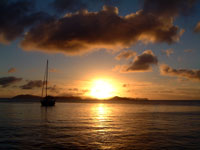Visit worldtravels.com for the full guide to British Virgin Islands. Build a complete British Virgin Islands travel guide and email to your clients - sign up for a trial subscription of World Travels Pro.
British Virgin Islands

Visitors to the British Virgin Islands will not be hard pressed to find out why they're nicknamed 'Nature's Little Secrets'. Abounding in natural beauty, the 36 islands making up the Caribbean archipelago (16 of which are uninhabited) have kept the effects of tourism at bay and offer unblemished beaches, numerous unspoilt anchorages, exotic fauna and flora and a relaxed, low-key lifestyle.
Situated about 50 miles (80km) east of Puerto Rico and just northeast of the US Virgin Islands, the islands and cays that make up the British Virgin Islands are clustered around the Sir Francis Drake Channel, which is renowned for its sheltered, crystal clear waters. Its location has made the archipelago a popular destination for yachting enthusiasts, and the islands are known as one of the best and safest sailing destinations in the world with reliable trade winds, near-perfect weather and a choice of secluded and intriguing bays to visit.
The largest island, Tortola, is the yachting capital of the Caribbean and the territory's main commercial centre, its beautiful mountainous slopes endowed with tropical fruits and flowers. It is an ideal base from which to explore some of the other inhabited islands such as Virgin Gorda, noted for its spectacular geological formations and one of the British Virgin Islands' most famous landmarks: The Baths. Travellers in search of a remote and rustic retreat, with the smell of freshly baked banana bread and the sounds of calypso music in the air, should head for the friendly beach haven of Jost Van Dyke, while the reefs surrounding Anagada's low-lying coral atoll and its miles of deserted white beaches shouldn't be missed by divers, snorkellers and sun worshippers. Besides these major islands, there are also dozens of secluded islets and cays to explore, each blessed with its own special charm and unique beauty.
Climate
The British Virgin Islands have a sub-tropical climate with high humidity, although temperatures are moderated by trade winds. Temperatures in summer average from 79-88°F (26-31°C) and between 72-82°F (22-28°C) in winter. Rainfall is erratic with occasional droughts.
Money
The official currency is the US Dollar (USD), which is divided into 100 cents. Most establishments on the larger islands accept credit cards and travellers cheques, but on Anegada it is best to have cash. Banks and exchange facilities can be found in Road Town, Tortola. ATMs are available in Tortola and Virgin Gorda.
Passport Visa
Travellers need a return or onward ticket and all the documents required for their next destination, as well as sufficient funds. As part of the Western Hemisphere Travel Initiative (WHTI), all travellers travelling between the United States and Canada, Mexico, Bermuda, and the Caribbean region are required to present a passport or other valid travel document to enter or re-enter the United States. If departing from the USA a valid passport will be required by immigration authorities.
Entry Requirements
- United States passport holders must have a valid passport or a Western Hemisphere Travel Initiative (WHTI) compliant document, or a government-issued photo ID, such as a driver's license, as well as proof of citizenship, such as an original or certified birth certificate. No visa is required for stays of up to 30 days. Extensions are possible.
- UK passport holders need a passport, but no visa is necessary.
- Canadian passport holders require a passport or a government-issued photo ID, such as a driver's license, as well as proof of citizenship, such as a birth certificate. No visa is required for stays of up to 30 days. Extensions are possible.
- Australian passport holders need a passport, but no visa is necessary for a stay of up to 30 days. Extensions are possible.
- South Africans need a passport, but no visa is necessary for stays of up to 30 days. Extensions are possible.
- Irish nationals need a passport, but no visa is necessary for stays of up to 30 days. Extensions are possible.
- New Zealand nationals require a passport, but no visa is necessary for stays of up to 30 days. Extensions are possible.
Health
There is a risk of dengue fever in the British Virgin Islands, so visitors should protect themselves with insect repellent. Limited medical facilities can be found on all the main British Virgin Islands and there is one hospital located in Road Town, Tortola. There is no hyperbaric chamber in the British Virgin Islands for diving emergencies, and complicated medical conditions are usually referred to the US Virgin Islands, Puerto Rico or the USA. Comprehensive medical and travel insurance is recommended.
Embassy Consulates
- British Embassy, Washington DC, United States: +1 202 588 6500.
- British High Commission, Ottawa, Canada: +1 613 237 1530.
- British High Commission, Canberra, Australia: +61 (0)2 6270 6666.
- British High Commission, Pretoria, South Africa: +27 (0)12 421 7500.
- British Embassy, Dublin, Ireland: +353 (0)1 205 3700.
- British High Commission, Wellington, New Zealand: +64 (0)4 924 2888.
Foreign Embassies
- United States Embassy, Bridgetown, Barbados (also responsible for the BVI): +1 246 436 4950.
- Canadian High Commission, Bridgetown, Barbados (also responsible for the BVI): +1 246 429 3550.
- Australian High Commission, Port of Spain, Trinidad and Tobago (also responsible for BVI): +1 868 628 0695.







